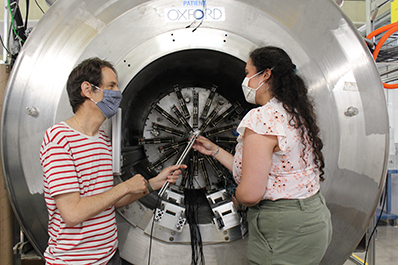Graduate Students
FRIB provides support and mentorship to you during your time as a graduate student with FRIB at MSU.
Support and mentorship throughout your FRIB experience
As a graduate student at MSU you will receive mentoring through your specific MSU Department, such as the Department of Physics and Astronomy, Department of Chemistry, and College of Engineering.
In addition to this guidance, the FRIB Associate Director (AD) for Education provides extra support and mentoring, based on a dedicated FRIB graduate student mentoring plan. Your plan outlines a wide variety of processes and activities aimed at optimizing your growth and success as a research scientist.
Additionally, we’ll support you along the way with on-site wellness coaches and wellness activities to help you navigate life’s challenges and keep things in balance.
This mentorship—plus our state-of-the-art education—helps to prepare you for the next step in your career in a reasonable amount of time: The average time for FRIB students to obtain a physics PhD is about 5.5 years*, significantly below the national average. In fact, all incoming students can perform research in the summer prior to starting the regular PhD program to get a head start.
Mentoring the moment you arrive at FRIB
 When you arrive as a graduate student at FRIB, we’ll work with you to explore and determine research opportunities that best fit your professional goals.
When you arrive as a graduate student at FRIB, we’ll work with you to explore and determine research opportunities that best fit your professional goals.
You’ll meet with the FRIB Office for Education, Workforce, and Career Development Associate Director and FRIB faculty, as well as representatives from the department you’re enrolled in. Together, you’ll form a guidance committee to help steer your coursework and research.
In addition, through a variety of activities, we help you create an informal network of faculty and staff who help you be successful in graduate school and provide information and contacts for the next steps in your career.
Support through FRIB assistantships and fellowships
We know education is a serious investment. That’s why our PhD students receive sufficient support to allow for program completion without the need for other sources of income or loans (provided they make adequate progress on their PhD thesis).
Typically, this support consists of:
- Half-time graduate teaching assistantships in the first year, which include a waiver for tuition and matriculation fees for all recommended courses, plus health insurance.
- Half-time graduate research assistantships after advancement to PhD candidacy with a higher stipend.
- Assistantships in the summer.
Especially qualified incoming graduate students are considered and nominated for a limited number of prestigious fellowships, (e.g., the FRIB Fellowship, the MSU College of Natural Science Fellowship, and MSU University Fellowships). We encourage and support our students to apply for fellowships provided by other organizations, such as the U.S. Department of Energy and the National Science Foundation.
Space and opportunities to be successful at FRIB
We make sure you’re supported in the FRIB Laboratory by offering office space and computers—plus the opportunity to work with other FRIB professionals, like those in the well-developed business, purchasing, electronics, and mechanical engineering departments, machine shop, and detector lab.
Colleagues in these departments help you to be successful in your research and make valuable contributions to your education.
Additional support resources
As a graduate student at MSU, you can take advantage of numerous services and programs that provide guidance and support, including:
- The Writing Center at MSU: Assistance with writing papers, journal articles, and dissertations
- MSU's Graduate School: Dissertation assistance, graduate information, and career services
- MSU Resource Center for Persons with Disabilities
- MSU Counseling and Psychiatric Services: Consultation and assessment, self-help resources, and appropriate referrals.
Thinking about making your teaching assistantship into a career? Check out MSU’s Certification in Teaching College Science and Mathematics program, which will prepare you for a career in post-secondary education and provide demonstrable evidence of your qualifications as a teacher.
*Counted from the moment a student enters their graduate program.

